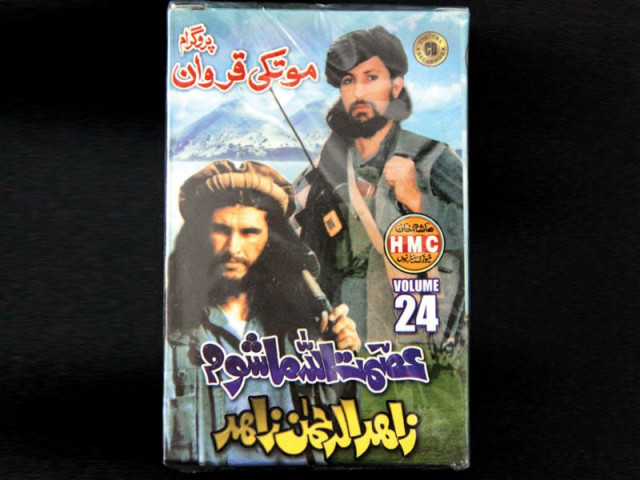Poetic militancy: What were once popular ringtones, are no longer in demand
Shopkeepers account the decline of sales to Bin Laden’s death, security clampdown and ‘change in spirit of...

The death of Al Qaeda chief Osama bin Laden and the ongoing military offensive in Khyber Pakhtunkhwa and the Federally Administered Tribal Areas have led to a loss of sales for a once-flourishing enterprise: audio cassettes and CDs containing poems by militant networks, particularly the Tehrik-e-Taliban Pakistan (TTP).
Music stores that once sold dozens of audio cassettes and video CDs of poetry by militant networks and recitations have almost shut up shop in the last year.
“We do not keep that stuff in our shop now because people rarely ask for such cassettes, CDs or for feeding TTP poems in their mobile memory cards,” said Gul, the owner of a music store at Juna Bazaar, Lea Market.
“When the TTP emerged in Pakistan, these cassettes came to the market from Peshawar, Quetta and Swat and flourished. These cassettes and CDs were recorded by new and unknown music centres at first but then almost every music centre started making their copies,” said Gul, as he recounted how the industry was set up. “People representing the TTP would give a free audio cassette to music centres for making replicas and then selling in the market, without asking for anything in return.”
As mobile phones became more widely accessible, music centres offered the facility to just store the poems on phone memory cards. “People used to ask for those poems as audio MP3 files along with other songs for their mobile memory cards. But since last year, very few people have asked for such poems. The government has also banned the sale of such poetry and songs but we keep them hidden from intelligence agencies.”
The police have directed the music centre owners not to keep these cassettes or CDs in their shops. While they are mostly sold in Lea Market and Al Asif Square in Sohrab Goth, in both areas shopkeepers avoid publicly displaying their wares.
Ghousullah, who runs another music centre, confirmed the trend. “After Osama’s death and the military operations the business of these cassettes and CDs has almost ended. We had hundreds of such cassettes but now we hardly have 50. People are not interested in them and new material is not coming to the market”.
Waiting to be inspired
Poets who once wrote odes for the TTP have also quit their work. “In the past two years I have not written something for Taliban. The Taliban’s activities do not attract me anymore,” said a Pashto poet from Bajaur Agency on condition of anonymity. “My poems used to raise the spirit of fight among those young Taliban who would go from Bajaur to Afghanistan to fight against Nato forces. Those poems were sung by Ziaur Rehman in his melodious voice, and Taliban members would start a sort of dance when listening to those poems.” He still believes that Osama bin Laden is alive and lives in the mountains of Afghanistan.
For inspiration, he would turn to Zarb-e-Momin, a publication that promoted ideas by militant groups. “Other poets and I would regularly read Zarb-e-Momin to know about the conquests and bravery of the TTP which would serve as a source of ideas for the poems,” he said. The poems were set to the tempo of famous Pashto songs, so they would resonate with listeners.
According to Syed Irfan Ashraf, an associate professor at the University of Peshawar’s department of journalism and mass communication, the death of Osama bin Laden may be a factor for the decrease in sales, because the government has tightened bans on circulation of literature due to ‘external pressure’. “However, there are a few other issues which I think have played a role to weaken the militant poetry or literature which was at its peak from 2008 to 2010.”
He credits it to the “the change in the spirit of time”. “Militants are constantly fighting against security forces everywhere. They have no time for the composition and recording of songs and poetry. The spirit of time has changed; you can’t deceive people with the name of Shariah anymore.”
Published in The Express Tribune, June 14th, 2012.



















COMMENTS
Comments are moderated and generally will be posted if they are on-topic and not abusive.
For more information, please see our Comments FAQ